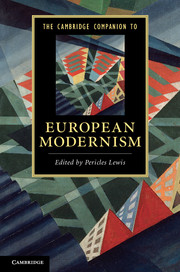13 - Eastern Europe
from PART II - PERIPHERAL MODERNISMS
Published online by Cambridge University Press: 28 September 2011
Summary
In August 1913, the Czech poet S. K. Neumann published the essay "Open Windows":
Our villagers dislike ventilation ... Their windows are closed in winter and in summer. Mine are open ... Let air come in! ... Until we caught up to Europe, we'd let things in indiscriminately. Today we've caught up to Europe, that is, there's no reason why what happens in 1913 in Paris, in London, in Rome, in Berlin, could not happen in 1913 in Prague. How it happens, though, this is a different question.
“To live with contemporaneity!” Neumann exclaimed.
In 1913, Neumann was a modernist in an age of imperialism, residing still in an empire of polyglots. Austria-Hungary was a vast domain, extending from Kraków to Sarajevo, from Vienna to Lemberg. Its cultural centers - like those of its imperial neighbor to the east - were marked by a cosmopolitanism inseparable from empire. In Warsaw and Kraków, Prague and Lemberg, Kiev and Budapest, art and literature from Paris and Berlin encountered philosophy and aesthetics from Moscow and Petersburg, making Eastern Europe the most cosmopolitan of European spaces.
- Type
- Chapter
- Information
- The Cambridge Companion to European Modernism , pp. 216 - 233Publisher: Cambridge University PressPrint publication year: 2011



